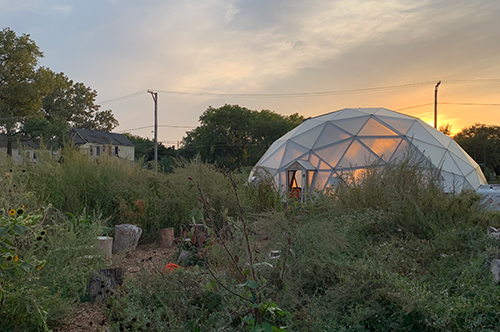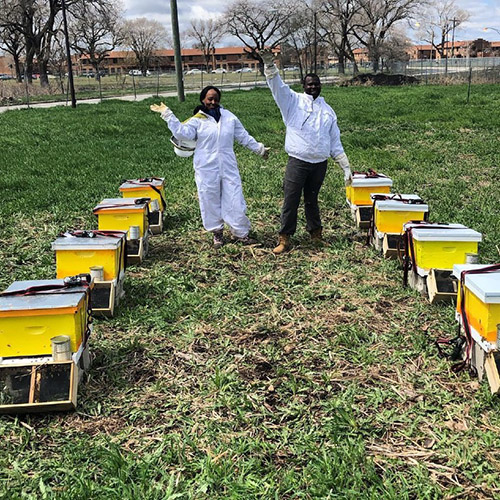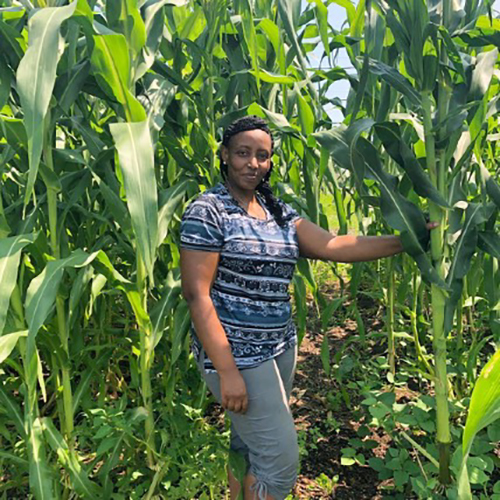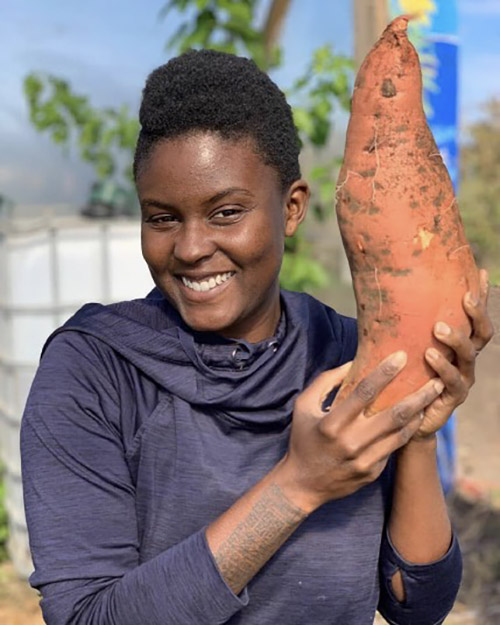Urban Growers Collective (Illinois, US)
My first attempt to meet Erika Allen, the Co-Founder and CEO Programs and Strategic Development of Urban Growers Collective (UGC) in Chicago was blocked by a freak snowstorm in April. My next try was a hot day in July 2019 at UGC’s South Chicago Farm, close enough to Lake Michigan that we occasionally felt a cool breeze. With Erika that day was Malcolm Evans, Farm Production Manager for all of UGC’s eight Chicago farms totaling 11 acres. UGC’s South Chicago Farm is in a neighborhood of single-family homes, once part of an even larger community whose land still surrounds the farm. Today, from the South Chicago Farm’s driveway, two-story houses are within easy view, yet the land there feels like the edge of a prairie, an evocation of what it was three hundred years ago. The neighborhood itself might be less populated today but the spirit of neighbors and love remain vibrant and strong.
Erika and Malcolm took me around the South Chicago Farm, its herbs and flowers and vegetables looking vibrant and rich, the greenhouses full. The Farm has plots for people in the community to use to grow produce for sale or to nourish their families. There is such a positive vibe at the South Chicago Farm because it is an environment that supports good health, healing, and creativity through food and culture. It lends itself to UGC’s efforts to increase access to outdoor play and learning for Black and Latinx youth in Chicago, especially those impacted by violence. Erika and Malcolm know that the ability of young people to deal with trauma can be radically transformed by providing safe spaces and using art as therapy.
Today, at its eight urban farms, UGC works to increase community cohesion and social capital, access to healthy food, job opportunities, and peoples’ overall well-being. The learning that occurs at UGC’s urban farms emphasizes tradition and spirituality, the key components of culture that underlie UGC’s community-oriented actions and the healing and sense of freedom these bring. UGC offers workshops on conserving heritage seeds, raising bees for honey and wax, restorative gardening practices, and medicinal herb cultivation among other topics. UGC also supports public art through murals, mosaics, and sculptures that are co-created by local artists and members of the community at UGC’s farm sites. UGC strives to reclaim food and urban farming narratives through hosting workshops that are co-facilitated by its partners, using a pay-what-you-can fee model. In addition, UGC is furthering its mission through the Green Era Renewable Energy and Urban Farm Campus, where UGC and its partner organizations are transforming a vacant brownfield into a 9-acre campus, with a 2-acre anaerobic digester and 7-acre urban farm. The Campus will remediate the site that was previously a brownfield and divert organic waste from landfills through anaerobic digestion to convert it to renewable energy and nutrient rich compost to be used on-site.
UGC’s work aligns with research that suggests urban farming can produce significant positive social, health and economic outcomes for communities including reduced crime and vandalism; reduced blight; increased community cohesion and social capital; greater access to healthy food; expanded opportunities for job creation; and improved mental health and well-being. UGC’s strategy has led to hundreds of teen job-training opportunities; unemployed Black and LatinX men beautifying vacant lots across Chicago; Head Start preschoolers engaged in school garden learning curricula; incubator farmers supplied with technical assistance and land; increased food access through its Fresh Moves Mobile Market on retrofitted vehicles; farmers’ markets and farm stands providing fresh, locally grown produce; and creating safe spaces on UGC farms for relationship building, skills development, and healing.
Thus, UGC is meeting its goals to build people’s knowledge of healthy food and food systems; increase access to safe healing spaces; improve social emotional learning and mindsets; improve job readiness and employment skills, increase access to entrepreneurial and economic opportunities; increase access to healthy food; transform community spaces; and improve the quality of life for South Chicagoans.
Return to the October 2021 Newsletter Index



